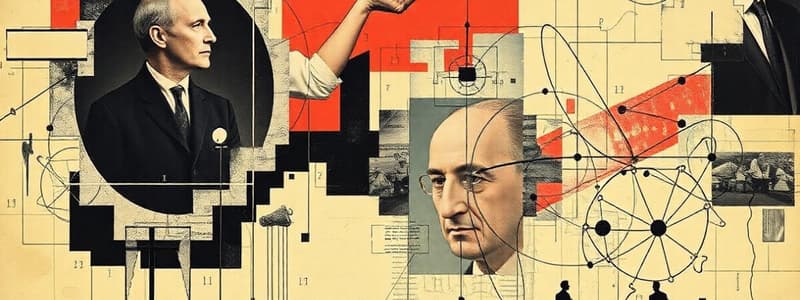Podcast
Questions and Answers
Which law states that an object in motion remains in motion unless acted upon by an external force?
Which law states that an object in motion remains in motion unless acted upon by an external force?
- Newton's Second Law of Motion
- Conservation of Energy
- Newton's First Law of Motion (correct)
- Zeroth Law of Thermodynamics
What is the relationship expressed by Coulomb's Law regarding the force between two charges?
What is the relationship expressed by Coulomb's Law regarding the force between two charges?
- F = k(q₁ + q₂/r²)
- F = k(m₁m₂/r²)
- F = k(q₁q₂/r)
- F = k(q₁q₂/r²) (correct)
According to the second law of thermodynamics, what happens to the entropy of an isolated system?
According to the second law of thermodynamics, what happens to the entropy of an isolated system?
- It becomes zero as temperature decreases.
- It always increases. (correct)
- It remains constant over time.
- It decreases as energy is transformed.
How is momentum conserved in an isolated system?
How is momentum conserved in an isolated system?
What physical principle explains the change in frequency of sound due to the motion of the source or observer?
What physical principle explains the change in frequency of sound due to the motion of the source or observer?
What is the formula for calculating kinetic energy?
What is the formula for calculating kinetic energy?
Which physical quantity is NOT conserved in a process involving inelastic collisions?
Which physical quantity is NOT conserved in a process involving inelastic collisions?
What factor does NOT influence the speed of sound in a medium?
What factor does NOT influence the speed of sound in a medium?
Flashcards are hidden until you start studying
Study Notes
Fundamental Concepts of Physics
- Definition: The study of matter, energy, and the interactions between them.
- Branches:
- Classical Mechanics: Motion, forces, energy (Newton's laws).
- Electromagnetism: Electric and magnetic fields and their interactions.
- Thermodynamics: Heat, energy transfer, laws of thermodynamics.
- Quantum Mechanics: Behavior of particles at atomic and subatomic levels.
- Relativity: Effects of speed on time and space (Einstein’s theories).
Key Principles
-
Newton's Laws of Motion:
- First Law: An object in motion stays in motion unless acted upon.
- Second Law: Force equals mass times acceleration (F = ma).
- Third Law: For every action, there is an equal and opposite reaction.
-
Conservation Laws:
- Energy: Total energy in an isolated system remains constant.
- Momentum: Total momentum before an event equals total momentum after.
- Charge: Electric charge is conserved in isolated systems.
-
Thermodynamics:
- Zeroth Law: If two systems are in thermal equilibrium with a third, they are in equilibrium with each other.
- First Law: Energy cannot be created or destroyed, only transformed.
- Second Law: Entropy of an isolated system always increases.
- Third Law: As temperature approaches absolute zero, entropy approaches a minimum.
-
Waves and Sound:
- Wave properties: Wavelength, frequency, amplitude.
- Sound: A longitudinal wave; speed depends on medium and temperature.
- Doppler Effect: Change in frequency due to relative motion of source and observer.
Key Formulas
-
Kinematics:
- v = u + at (Final velocity = Initial velocity + acceleration x time)
- s = ut + (1/2)at² (Displacement)
-
Work and Energy:
- W = Fd cos(θ) (Work = Force x displacement x cosine of angle)
- KE = (1/2)mv² (Kinetic Energy)
- PE = mgh (Potential Energy)
-
Electromagnetic Equations:
- Coulomb's Law: F = k(q₁q₂/r²) (Force between charges)
- Ohm's Law: V = IR (Voltage = Current x Resistance)
Important Units
- Meter (m): Unit of distance.
- Kilogram (kg): Unit of mass.
- Second (s): Unit of time.
- Joule (J): Unit of energy.
- Newton (N): Unit of force.
- Ampere (A): Unit of electric current.
Applications of Physics
- Engineering: Groundwork for mechanical and civil engineering.
- Medicine: Use of imaging techniques and radiation therapies.
- Environmental Science: Understanding energy systems and climate change.
- Technology: Development of electronic devices and innovations.
Notable Physicists
- Isaac Newton: Laws of motion and universal gravitation.
- Albert Einstein: Theory of relativity, photoelectric effect.
- Niels Bohr: Model of the atom and quantum theory.
- Richard Feynman: Quantum mechanics and particle physics.
Fundamental Concepts of Physics
- Physics studies matter, energy, and their interactions.
- It encompasses various branches such as classical mechanics, electromagnetism, thermodynamics, quantum mechanics, and relativity.
Classical Mechanics
- Focuses on motion, forces, and energy.
- Based on Newton's laws of motion.
Electromagnetism
- Deals with electric and magnetic fields and their interactions.
- Explains phenomena like electricity, magnetism, and light.
Thermodynamics
- Studies heat, energy transfer, and the laws of thermodynamics.
- Expounds on concepts like temperature, entropy, and heat engines.
Quantum Mechanics
- Investigates the behavior of particles at atomic and subatomic levels.
- Explains phenomena like wave-particle duality and quantum entanglement.
Relativity
- Explores the effects of speed on time and space.
- Includes Einstein's theories of special relativity and general relativity.
Key Principles
Newton's Laws of Motion
- First Law: An object at rest stays at rest, and an object in motion stays in motion with the same speed and direction unless acted upon by an unbalanced force.
- Second Law: The acceleration of an object is directly proportional to the net force acting on it and inversely proportional to its mass.
- Third Law: For every action, there is an equal and opposite reaction.
Conservation Laws
- Energy: The total energy in an isolated system remains constant.
- Momentum: The total momentum before an event equals the total momentum after the event.
- Charge: Electric charge is conserved in isolated systems.
Thermodynamics
- Zeroth Law: Two systems in thermal equilibrium with a third system are also in thermal equilibrium with each other.
- First Law: Another way of stating the law of conservation of energy, which states that energy cannot be created or destroyed, only transferred or transformed.
- Second Law: The entropy of an isolated system always increases over time.
- Third Law: As the temperature of a system approaches absolute zero, the entropy of the system approaches a minimum value.
Waves and Sound
- Wave properties: All waves exhibit properties such as wavelength, frequency, and amplitude.
- Sound: A longitudinal wave that requires a medium to travel. The speed of sound depends on the properties of the medium and temperature.
- Doppler Effect: The change in frequency of a wave due to the relative motion of the source and the observer.
Key Formulas
Kinematics
- v = u + at (Final velocity = Initial velocity + acceleration x time)
- s = ut + (1/2)at² (Displacement)
Work and Energy
- W = Fd cos(θ) (Work = Force x displacement x cosine of angle)
- KE = (1/2)mv² (Kinetic Energy)
- PE = mgh (Potential Energy)
Electromagnetic Equations
- Coulomb's Law: F = k(q₁q₂/r²) (Force between charges)
- Ohm's Law: V = IR (Voltage = Current x Resistance)
Important Units
- Meter (m): Unit of distance.
- Kilogram (kg): Unit of mass.
- Second (s): Unit of time.
- Joule (J): Unit of energy.
- Newton (N): Unit of force.
- Ampere (A): Unit of electric current.
Applications of Physics
- Engineering: Provides foundational principles for mechanical and civil engineering.
- Medicine: Enables the development and application of imaging techniques and radiation therapies.
- Environmental Science: Used to understand energy systems and climate change.
- Technology: Drives the development of electronic devices and other innovations.
Notable Physicists
- Isaac Newton: Developed the laws of motion and universal gravitation, revolutionizing our understanding of the universe.
- Albert Einstein: Proposed the theory of relativity, which changed our understanding of time, space, gravity, and the universe.
- Niels Bohr: Developed the model of the atom, pioneering quantum mechanics.
- Richard Feynman: Made significant contributions to quantum mechanics, particle physics, and quantum electrodynamics.
Studying That Suits You
Use AI to generate personalized quizzes and flashcards to suit your learning preferences.




